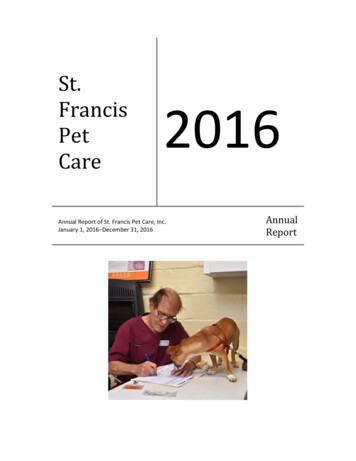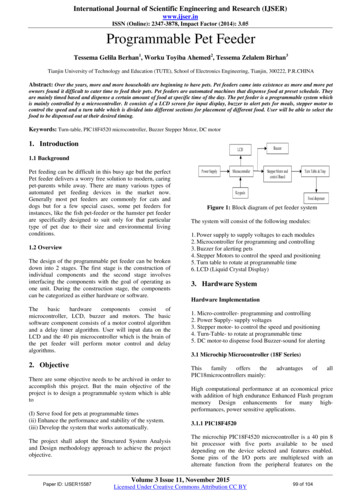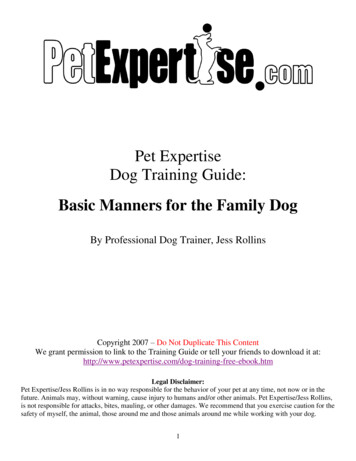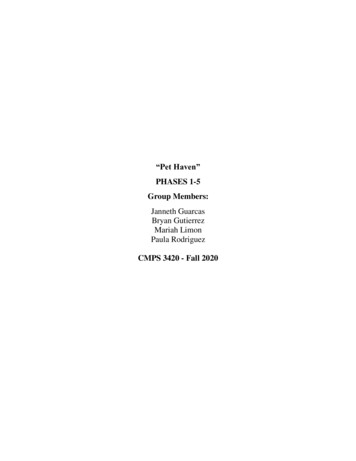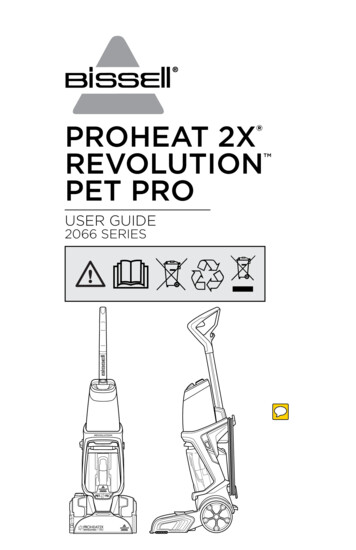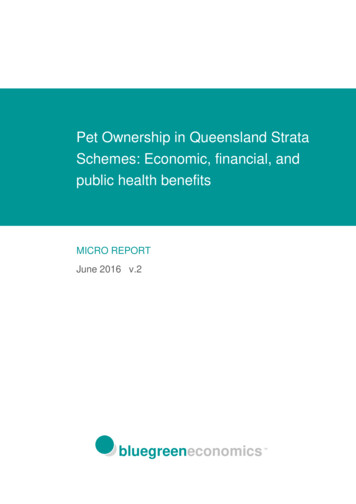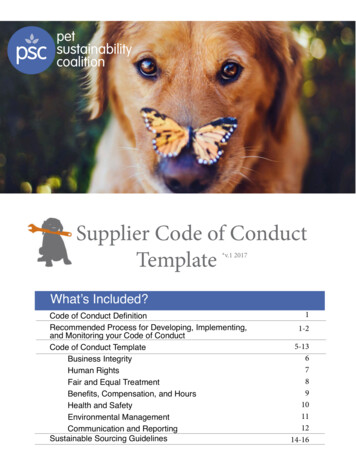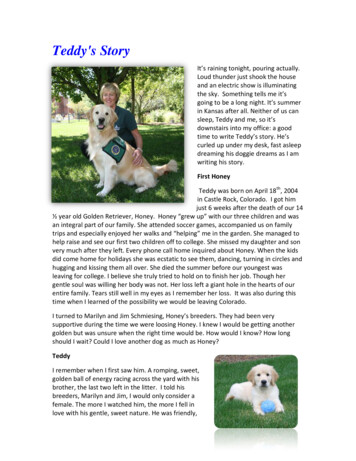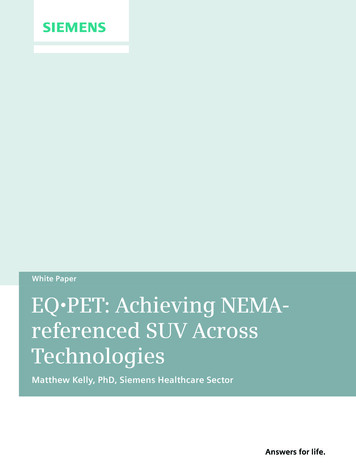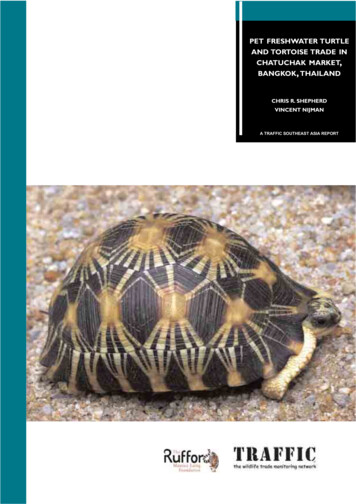
Transcription
PET FRESHWATER TURTLEAND TORTOISE TRADE INCHATUCHAK MARKET,BANGKOK, THAILANDCHRIS R. SHEPHERDVINCENT NIJMANA TRAFFIC SOUTHEAST ASIA REPORT
Published by TRAFFIC Southeast Asia,Petaling Jaya, Selangor, Malaysia 2008 TRAFFIC Southeast AsiaAll rights reserved.All material appearing in this publication iscopyrighted and may be reproduced withpermission. Any reproduction in full or inpart of this publication must credit TRAFFICSoutheast Asia as the copyright owner.The views of the authors expressed in thispublication do not necessarily reflect thoseof the TRAFFIC Network, WWF or IUCN.The designations of geographical entities inthis publication, and the presentation of thematerial, do not imply the expression of anyopinion whatsoever on the part of TRAFFICor its supporting organizations concerningthe legal status of any country, territory, orarea, or its authorities, or concerning thedelimitation of its frontiers or boundaries.The TRAFFIC symbol copyright andRegistered Trademark ownership is held byWWF. TRAFFIC is a joint programme ofWWF and IUCN.Layout by Noorainie Awang Anak,TRAFFIC Southeast AsiaSuggested citation: Chris R. Shepherd andVincent Nijman (2008): Pet freshwater turtleand tortoise trade in Chatuchak Market,Bangkok, Thailand.TRAFFIC Southeast Asia, Petaling Jaya, MalaysiaISBN 9789833393077Cover: Radiated Tortoises Astrochelys radiata were the mostnumerous species of tortoise obdserved during this studyPhotograph credit: Chris R. Shepherd/TRAFFIC Southeast Asia
PET FRESHWATER TURTLE AND TORTOISETRADE IN CHATUCHAK MARKET, BANGKOK,THAILANDChris R. Shepherd/TRAFFIC Southeast AsiaChris R. Shepherd and Vincent NijmanIndian Star Tortoies Geochelone elegans are very popular due to theirbeautiful carapace pattern
CONTENTSAcknowledgementsiiExecutive summaryiiiIntroduction1Protection of turtles and tortoises in Thailand, and trade regulations2Methods3Observations and discussion4Market observations and reported smuggling techniques7Conservation status of freshwater turtles and tortoises observedin Chatuchak Market9Discussion and conclusions10Recommendations11References13
ACKNOWLEDGEMENTSThe authors thank Azrina Abdullah, Julie Gray, Richard Thomas, Stephen Broad and James Compton fortheir valuable comments on earlier drafts of this paper, and to Julia Ng for assisting in the analysis ofUNEP-WCMC data. Jonathan Murray is also thanked for providing valuable information for this report.Pet freshwater turtle and tortoise trade in Chatuchak Market, Bangkok,Thailandii
EXECUTIVESUMMARYThe Chatuchak or Weekend Market in Bangkok is an important hub for the sale of freshwater turtles andtortoises, many of which are prohibited from trade. Buyers from other parts of Asia, especiallyindividuals from Japan, Malaysia and Singapore, are known to purchase large numbers of turtles from thedealers in Chatuchak Market for retail in their respective countries. The majority of the species observedduring surveys carried out in 2006 and 2007 were exotic (i.e. not native to Thailand). Much of theimporting and exporting of freshwater turtles and tortoises to and from the Chatuchak Market is believedto be conducted illegally in contravention of CITES-related laws.During this study, which was carried out over three days, a total of 786 specimens were observed in retailoutlets, representing 27 species, 25 of which are not native to Thailand. A total of 285 specimens of fivespecies listed in Appendix I of CITES were observed. The fact that these species were openly availablein the market, and that the dealers openly stated that the specimens were smuggled into Thailand, and areregularly smuggled out, highlights a severe challenge to effective enforcement under existing Thai law.Dealers were observed describing to potential buyers techniques used to smuggle non-native animals in andout of Thailand in step-by-step detail. Furthermore, dealers in the Chatuchak Market carried out the tradein illegally-sourced species openly and with little regard for any regulation, which highlights gaps inmarket monitoring and enforcement by Thai authorities. The main inhibiting factor impeding enforcementof CITES, is the loopholes in the current national legislation, and until these are amended, Thailand willcontinue to be a hub for smuggling of CITES-listed species.Based on the findings of this study, TRAFFIC makes the following recommendations:1. The Wild Animal Reservation and Protection Act 1992 (WARPA) needs to be amended to addresscurrent loopholes that prevent authorities from taking action against the illegal trade of non-nativespecies of freshwater turtles and tortoises. In particular, Section 23 of WARPA should include“possession” in its provision for CITES listed species and for the burden of proof to be on thebuyer, rather than the enforcement agency. Due to these and other gaps in legislative coverage, theCITES Secretariat should consider a reassessment of Thailand’s legislation under the NationalCITES Legislation Project and encourage Thailand to amend legislation as soon as possible.2. Authorities (Customs, Immigration, Quarantine and Security - CIQS) in the airports and otherpoints of international entry and exit must be more vigilant to prevent such quantities of speciesfrom being traded in Thailand. These authorities should ensure that their staff are regularly trainedin CITES implementation and in other relevant fields, such as species identification and profilingand targeting of potential smugglers in order to continue to improve Thailand’s detection of illegalcargoes of wild animals and plants.3. Regular monitoring by Thai enforcement agencies and NGOs of the markets in Thailand should becarried out to gauge the scale of trade and identify trends in species composition, countries oforigin, and any end-market destinations beyond Thailand.4. Offenders that are found importing and exporting species of freshwater turtles and tortoises shouldbe prosecuted to the full extent of the law, to serve as a deterrent. Current fines and penalties aretoo low to serve as an effective deterrent and should therefore be increased.Pet freshwater turtle and tortoise trade in Chatuchak Market, Bangkok,Thailandiii
James Compton/TRAFFIC5. Thailand is presently the lead country for the ASEAN Wildlife Enforcement Network (ASEANWEN). It has established an inter-agency national task force, with successful seizures conductedat various border points and cities in Thailand for CITES-listed species. This could be replicatedat local levels for more interagency efforts to be conducted country-wide. However, enforcementwill be limited if the current WARPA is not amended which would enable officers to monitor andtake action against the illegal traders.A variety of tortoises for sale in Chatuchak MarketPet freshwater turtle and tortoise trade in Chatuchak Market, Bangkok,Thailandiv
INTRODUCTIONFreshwater turtles and tortoises around the world are found in trade for a variety of purposes, being usedas meat, ingredients in traditional medicines and as pets. Illegal and unsustainable trade has resulted inmany species becoming threatened (Compton, 2000; Lopez and Schoppe, 2004). Numerous species offreshwater turtles and tortoises are traded as pets in major cities in East and South-east Asia (Orenstein,2002), many of which are not native to the Asian region (Sze and Dudgeon, 2006). The supply and demandof freshwater turtles and tortoises appears to be increasing throughout South-east Asia (Orenstein, 2002).Many of the species are acquired and traded illegally (Shepherd et al., 2004; Warchol, 2004). Uncommonor geographically isolated species, as well as rare colour varieties or morphs are in high demand in the pettrade (Shepherd and Ibarrondo, 2005). In some cases, as the rarity of a species increases, so too does thedemand (Shepherd and Ibarrondo, 2005; Courchamp, et al., 2006). These factors combine to increase thelevels of threat to individual species.One of the main hubs for trade in freshwater turtles and tortoises for pets in South-east Asia is theChatuchak (sometimes spelt Jatujak in transliteration from Thai to English) market in Bangkok, Thailand(van Dijk and Palasuwan, 2000). As this market has been recognized as a major trade hub for illegalwildlife, a campaign, called ‘Sold Out’ was recently launched by a NGO, PeunPa, in February 2007 withthe intentions of ending the illegal trade. Numerous shops at this market sell animals including birds,reptiles, and aquarium fish. A selected number of shops specialize in freshwater turtles and tortoises, andlizards and snakes, offering a wide range ofboth native and exotic species.James Compton/TRAFFICDespite being recognised as such a tradecentre by the turtle and tortoise conservationcommunity, as of yet, no systematic surveyshave been carried out at this market. Verylittle is known about species composition,numbers and trade dynamics at Chatuchak,and to what extent the trade is legal. Withsuchlittleinformation,effectiveinterventions to stem the illegal trade in thismarket would be difficult to make.Leopard Tortoise Geochelone pardalis, Radiated TortoiseAstrochelys radiata and Red-footed Tortoises Geochelonecarbonaria displayed for sale in Chatuchak MarketWith the aim of improving such efforts,TRAFFIC carried out systematic surveys ofthe live turtle and tortoise trade in Chatuchakin 2006 and 2007 to determine the levels ofavailability, and calculate the scale ofillegal trade in order to makerecommendations for improved regulationand control.Significant numbers ofthreatened and rare species, as classified bythe 2006 IUCN Red List of ThreatenedSpecies, were found, including many thathave been imported into Thailand. PresentedPet freshwater turtle and tortoise trade in Chatuchak Market, Bangkok,Thailand1
here is an overview of the relevant Thai legislation, including how such laws implement the Conventionon International Trade in Endangered Species of Wild Fauna and Flora (CITES) to which Thailand is aParty; along with the market survey results and data analysis, and recommendations.Protection of turtles and tortoises in Thailand, and trade regulationsAll exotic species of freshwater turtlesand tortoises listed in the Appendices ofCITES are also regulated by WARPA inits function as Thailand’s CITESimplementing legislation.Chris R. Shepherd/TRAFFIC Southeast AsiaAll species of freshwater turtle andtortoise native to Thailand are protectedfrom exploitation under the Wild AnimalReservation and Protection Act B.E. 2535(WARPA), which was last revised in1992 (van Dijk and Palasuwan, 2000).Thailand became a Party to CITES in Indian Star Tortoises Geochelone elegans are very popular in the1983. The National Park, Wildlife and pet trade. Dealers state that they are smuggled from IndiaPlant Conservation Department is thelead CITES Management Authority in Thailand, responsible for the implementation and enforcement ofthis Convention. All Parties to CITES have been categorized under the CITES National LegislationProject, based on the ability of national legislation to implement and enforce CITES, as follows:- 1 (legislation that is believed to meet the requirements for the implementation of CITES),- 2 (legislation that is believed not to meet all requirements for the implementation of CITES) and- 3. (legislation that is believed not to meet the requirements for the implementation of CITES). Thailandhas been rated in category 1.Relevant sections to the regulation of the trade in native and non-native CITES-listed species withinWARPA include:Chapter 3 – Hunting, Breeding, Possessing and Trading of Wild Animals, Carcasses and Products Thereof,Section 19 ‘No person shall be in possession of reserved wild animal, protected wild animal,carcasses of reserved or protected wild animals, except those bred in captivity’.Section 20 states that: “No person shall engage in trading of reserved wild animals, protected wildanimals, carcasses of reserved and protected wild animals, and products except protected wildanimals obtained from breeding in captivity”. The penalty for violating this law is imprisonmentnot more than two years, fine not exceeding THB 20,000 (USD 635), or both.However, Chapter 3 does not cover possession or trading of exotic species (species not native to Thailand).Pet freshwater turtle and tortoise trade in Chatuchak Market, Bangkok,Thailand2
Species not native to Thailand are covered under Chapter 4 – Importation, Exportation, Transitorymovement of Wild Animals and Wild Animal check point. Chapter 4, Section 23 states that: “No personshall engage in the importation and exportation of wild animals or carcass listed on the prohibition list ofthe Minister. Importation and exportation of protected and reserved wild animals and carcass isprohibited unless these were obtained from breeding in captivity”. The penalty, as stated in Chapter 8, forviolating Section 23 is imprisonment not more than four years, and a fine not exceeding THB 4000 (USD127), or both.Section 24 of the same Chapter states that all importation and exportation, and transitory movement of wildanimals and carcass requires a permit from the Director General in accordance with CITES.There is no mention of “possession” or “domestic trade” of species on the prohibition list, only importingand exporting.METHODSObservations were made on the trade of freshwater turtles and tortoises in Bangkok’s Chatuchak Market,also known as the Weekend Market, on one day in each January and August, 2006 and April 2007 (thelatter being after the launching of the “Sold Out” campaign). Only retail outlets that specialized in sellingreptiles were selected, (14 shops in 2006 and 15 in 2007 at the time of the survey) for inclusion in thesurvey. Two species of freshwater turtle, the Red-eared Slider Trachemys scripta elegans and the ChineseSoftshell Turtle Pelodiscus sinensis, are widely offered for sale in aquarium shops but rarely in thespecialised reptile shops. On account of their
Pet freshwater turtle and tortoise trade in Chatuchak Market,Bangkok,Thailand iii. 5. Thailand is presently the lead country for the ASEAN Wildlife Enforcement Network (ASEAN- WEN). It has established an inter-agency national task force, with successful seizures conducted at various border points and cities in Thailand for CITES-listed species. This could be replicated at local levels for more .
